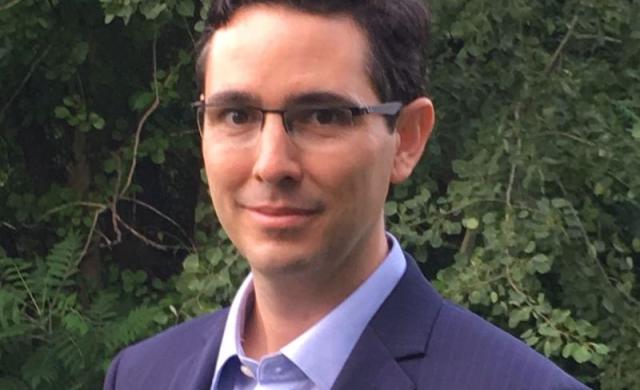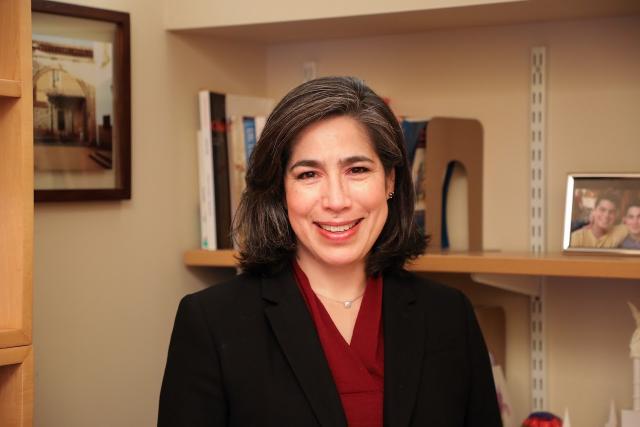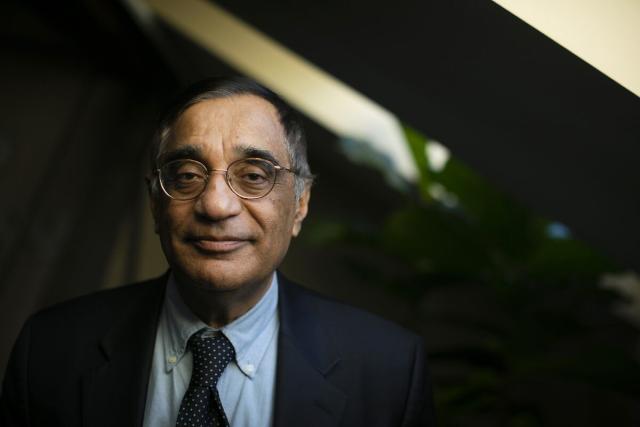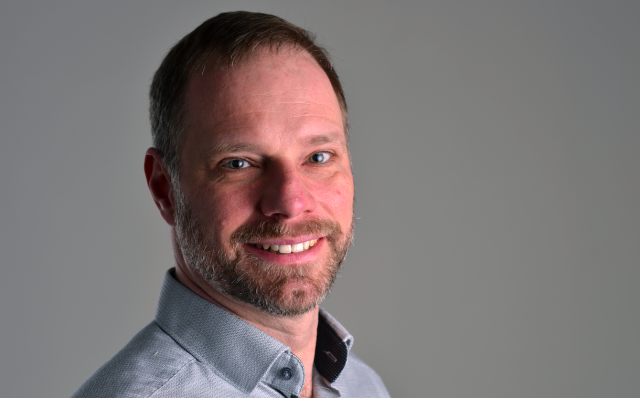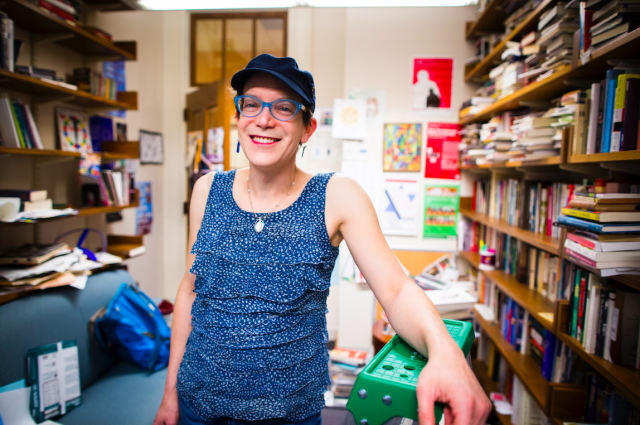For David Atherton, becoming comfortable with doubt can be a powerful learning tool.
In his junior year of high school, David Atherton had the opportunity to spend a year abroad. Tired of his inward-looking world, he flipped through the catalog of countries and chose the one most different from his hometown in Southern California. He soon found himself completely immersed in the language and culture of rural northern Thailand, which led to a reckoning of his own identity. “I had this realization that to enjoy my time there, I had to take what I thought my identity was, which was something that had actually been constructed over the course of years, and let that go and construct a new one. But that was terrifying until I did it. And then it was so empowering.” Emerging from that experience, and very confident about wanting to pursue Asian Studies, he applied to schools with strong Asian Studies programs in the US. “I found delight in spending time in different cultures and learning different languages, which has been a big part of everything since.”
Atherton moved across the country to study East Asian Studies at Harvard College, where he focused on Chinese literature and film. He wasn’t always confident about his future, especially after graduating from college, but it was during these moments of doubt that he learned the power of being thrown off balance. Doubt could strike even when pursuing his passions. He recalls hitting a low point while pursuing his PhD in Japanese literature in New York when he felt completely lost about his life path. His advice: “Make friends with the doubt.” Instead of feeling overwhelmed by the pressure of needing all the answers immediately, Atherton suggests “being in the presence of the feeling of doubt, and asking, what does that feel like? What is it here to teach me? I don't have to have an answer. But I can sit with this experience. It took many more years to learn that doubt is a great teacher.”
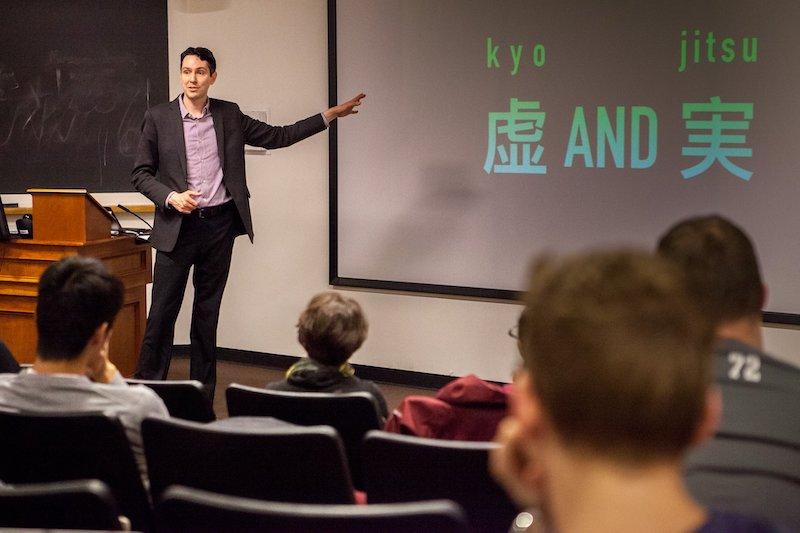
David Atherton teaching, "How to Read a Revenge Tale in Early Modern Japan" to his students.
Another one of these moments of uncertainty came in the spring of 2021, when Atherton taught a Gen-Ed class titled “Creativity.” Having applied to teach the course before the pandemic, he was confronted with the task of adapting the class to a virtual format. Atherton asked himself, “What do we all need in a moment of crisis? How do we get grounded again, and what does it mean to get in touch with our humanity?” With the help of colleagues and graduate students, Atherton created a highly interactive course that pushed students to experiment outside their comfort zone. “One of the lessons of the class is the importance of collaboration and that you don't have to do it all yourself. Things are so much more dynamic when other voices are in the mix. Discovering that it’s better when there’s a village of voices was something that made me so happy. To hear that reflected back from the students, that everyone was recognizing the communal aspect of the class, was something that made me really proud.”
As a professor of East Asian Languages and Civilizations, Atherton’s favorite memories have been interacting with his students, and he encourages all students to go to office hours! “The classroom experience of connecting with students is very, very fulfilling. When I'm in the midst of the semester, and totally exhausted, it’s the students that keep me going.” His teaching philosophy is that when you hear laughter, it’s a good sign that learning is happening. “When an unexpected connection is made, our reaction is to laugh. A classroom that's filled with laughter is a really good thing.”
As for recent projects, Atherton is finishing up his first book project, Writing Violence in an Age of Peace: Literary Form and the Politics of Perception in Early Modern Japanese Fiction, which has “been a long and arduous journey.” This process has entailed its own learning curve, wrought with moments of doubt. “The book itself has its own kind of personality, and it set its own pace. The path was a bit crazy. But I eventually learned to just trust in that rather than resist it. After that, it all started to come together.”
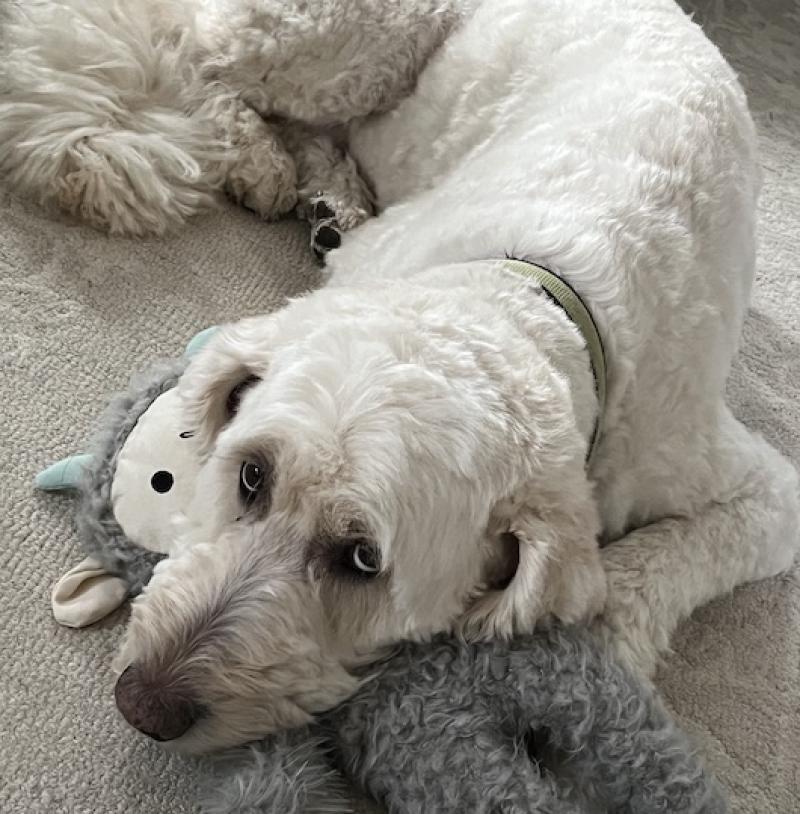
David Atherton's "really goofy dog," Alfie.
Outside of the classroom, Atherton enjoys spending time with his wife, son, and “really goofy dog.” In addition, he loves traveling and being immersed in different languages. Recently, Atherton has begun learning Portuguese, not because of any relationship to his job, but simply for the joy of learning a language.
In a full circle moment, Atherton now inhabits the same office as his thesis advisor during his undergraduate years. Looking back on his time at Harvard and beyond, Atherton offers some guiding words from someone who has been a student: “Live with the doubt. It is an important part of you. Don't make it so hard on yourself trying to erase the doubts, embrace them.” Atherton brings up the Buddhist parable of the second arrow. “The Buddha refers to the first arrow, which you can't avoid being hit by– pain is inevitable in this life. The second arrow is our emotional response to the first arrow: resisting it, lamenting it, complaining about it, wishing it had never hit us. You can choose to dodge the second one. You don't have to be hit by that arrow.”
In addition to his Gen-Ed course “Creativity,” David Atherton teaches several courses in the Department of East Asian Languages and Civilizations, including “Early Modern Japanese Literature and Culture,” “Traditional Japanese Literature: From Mythology to (Early) Modernity,” and “Classical Japanese,”which can be viewed in the Harvard course directory.

